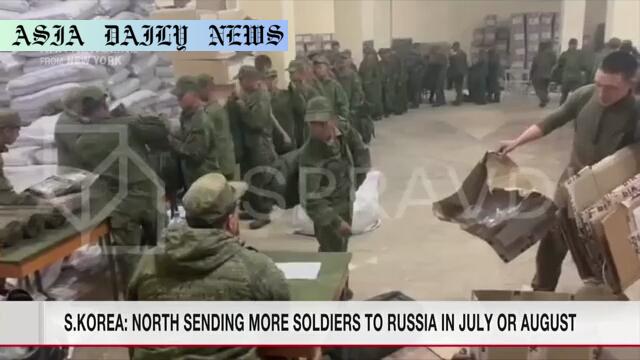Military Cooperation: North Korea to send troops and ammunition supply to aid Russia’s military and infrastructure needs.

North Korea’s Potential Deployment of Troops and Arms Supply
South Korea’s National Intelligence Service (NIS) recently raised concerns over an increase in military cooperation between North Korea and Russia. Intelligence reports indicate that Pyongyang is planning to dispatch additional troops to aid Russia as early as July or August. This action comes amid growing signs of close ties between Kim Jong Un’s regime and Moscow. Detailed analysis reveals a multi-pronged strategy by Pyongyang, which includes mobilizing military cargo such as 10 million rounds of ammunition and advanced missile systems directed toward enhancing Russia’s war capabilities.
The deployment strategy involves not only soldiers, including specialized personnel such as sappers but also significant logistical support. Moreover, intelligence findings have pointed to deliberate efforts by North Korea to establish a structured selection and mobilization process for these soldiers. On the other hand, Russia’s support for North Korea takes the form of air defense missiles, cutting-edge electronic jamming devices, and promises of deeper economic cooperation, cementing the symbiotic relationship.
Key Developments in the Partnership: Implications for Global Security
The meeting between Russian Security Council Secretary Sergei Shoigu and North Korean leader Kim Jong Un in June 2023 appears pivotal in accelerating the pace of collaboration between the two countries. Reports suggest that the meeting concluded with Kim agreeing to send approximately 6,000 troops to the Russian region of Kursk, a move touted as critical for post-conflict reconstruction of infrastructure. This cooperation is framed against the backdrop of escalating conflicts globally, thereby raising concerns about its implications for global stability and regional alliances.
This exchange represents an alarming trend, particularly since Pyongyang’s ammunition transfer, via vessels and military planes, represents a significant resource for Moscow. These contributions are not merely transactional but indicative of an evolving alliance between two nations historically under heavy international scrutiny. Questions surrounding the preservation of peace and adherence to global sanctions emerge prominently from these developments.
Broader Geo-Political Tensions
The expanding partnership between North Korea and Russia poses strategic dilemmas to neighboring countries and Western powers. This engagement underscores a broader pattern of adversarial states consolidating resources and leveraging each other’s strengths for mutual benefit. Diplomatically, South Korea and its allies face increased pressure to respond decisively without provocation that may escalate the situation further.
As sanctions aim to isolate North Korea and Russia economically and militarily, these backdoor partnerships may blunt their impact. South Korea’s National Intelligence Service has explicitly warned global powers to pay heed to growing logistics of dangerous military exchanges. Such burgeoning relationships have a far-reaching impact on global security paradigms and nuclear non-proliferation treaties, underscoring their critical evaluation and handling.
The Urgent Need for International Attention
The latest revelations regarding North Korea’s military cooperation with Russia demand a comprehensive international approach to maintain security on both regional and global scales. Strengthening alliances and fostering multilateral dialogues with neighboring nations should be a priority for policymakers. Equally critical is ensuring the enforcement of pre-existing sanctions to deter actions that promote unauthorized arms transfers or aid.
It is paramount for global powers to take these signs seriously and proactively engage in preventive measures to minimize risks that may develop from the collaboration between Pyongyang and Moscow. The growing intensity and level of mutual dependence demonstrated by these two nations is a clear call for action that cannot afford to be ignored.
Commentary
The Complex Dynamics of North Korea-Russia Relations
The burgeoning relationship between North Korea and Russia is an intricate web of mutual cooperation underlined by tactical exchanges. As global powers push heavy sanctions on both nations, it is unsurprising to see them drawing closer. This partnership, however, poses critical challenges to global peace and stability. The logistics of sending additional North Korean troops to Russia by the middle of 2023 seems well-calculated and timely. Leveraging Pyongyang’s ready workforce to reinforce Russian infrastructure and eventually its defense capabilities is as strategic as it is contentious.
As South Korea and its allied nations take stock of such developments, one can’t help but wonder how vulnerable existing diplomatic strategies are to such emerging alliances. Both nations, notorious for defying international norms, appear resolute in working together to counter external pressures. This speaks volumes about the changing dynamics in global geopolitics and warrants collective vigilance.
Implications for International Diplomacy
The forming of close military ties challenges the efficacy of broader multilateral frameworks like the United Nations. Russia seems to benefit from North Korea’s military resources, while Pyongyang leverages Moscow’s advanced technologies. However, it is crucial to recognize the long-term ramifications of these exchanges—particularly the erosion of trust required to uphold sanctions and treaties that prevent escalatory conflict.
In the larger scheme of things, such collaborations may spark an arms race or even broader conflicts. This potential sheds light on the fragility of ensuring peace in today’s high-stakes global environment. Every move, from sanctions to diplomatic detentes, requires precision.
The Need for Proactive Responses
It is vital for the international community to respond with both vigilance and strategy. While imposing tighter sanctions may appear as a straightforward route, its long-term effectiveness will depend on curbing illicit transactions and monitoring military exchanges. Nations, especially those in East Asia, must also strengthen alliances, collectively signaling a clear intolerance for actions that jeopardize peace.
Ultimately, while these developments are unsettling, they reaffirm the timeless importance of unity and collaboration among countries committed to preserving global safety and security.


